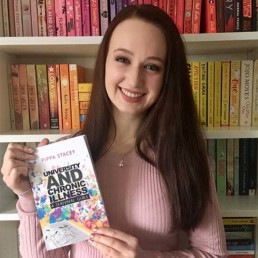
Written by Pippa Stacey
Pippa Stacey is a writer and blogger based in Yorkshire. She studied BSc Psychology in Education at the University of York, and acquired her chronic illness during the first year of her studies. As a graduate, Pippa now works in online communications in the charity sector, as well as freelance writing and blogging in a personal capacity at Life Of Pippa.
During my first year of university, I was your typical student: studying hard, partying harder, travelling the country with various sports teams and for dance competitions, volunteering, and working towards an honours degree. By the same time the following year, I was struggling to stand up on my own.
I’d been battling for answers to my mystery symptoms since the age of 15, but it was only when my health significantly relapsed and I was struck down by an onslaught of debilitating pain and fatigue, that I was finally diagnosed with Myalgic Encephalomyelitis (ME/CFS). Naturally, this all happened during my very first year of university, just as my young adult life was beginning.
With plenty of support and adjustments, I managed to continue my studies and graduated in 2016, but it wasn’t without its challenges. Adapting to life as a newly disabled student, I often felt lonely, isolated, and like nobody else in the world could understand what I was going through. I distinctly remember being shocked at what little support was available and how much I had to advocate for myself, how hard I had to fight for what I was entitled to, and how disheartening it often seemed. Being a student can be a tough time for any young person but dealing with a fluctuating health condition adds a whole new dimension of difficulty.
Despite this, my time at university formed some of the very best years of my life. I studied a subject I loved and graduated with a 2:1, met a wonderful group of friends who I still see regularly, and got to live in the beautiful city of York… where I’ve remained ever since!
It’s no secret that the world of education and employment have a long way to go before they can be described as truly inclusive. However, I hope that by sharing my story, more people in similar situations to my own will feel better informed not only about the challenges being a student can bring, but also how to tackle these head-on and have the best experience possible.
After I completed my own higher education, I knew I wanted to create a resource that would fill the gap I so painfully felt during my own student years.
My debut non-fiction book, University and Chronic Illness: A Survival Guide, is a chatty and relaxed, yet balanced and informative, resource: one that’s sincere and realistic about the challenges of studying with a fluctuating health condition, yet one which will hopefully empower future students to make informed decisions and to really get the most out of their time at university. Essentially, this book is made up of all the things I wish I’d had somebody to tell me back then.
The advice in this book comes from somebody who’s experienced the process first-hand: somebody who knows that your reasons for going to university often stretch far beyond only the lectures and studying. My book therefore strives to encompass all aspects of student life: socialising, independent living, managing your money, and what to do when things go wrong.
As well as this guide hopefully being useful to individual students with long-term conditions, I’m doing everything in my power to make sure it also reaches university, college and school support staff, to help them better understand the unique challenges such students can face. My hope is that it will help to spark some important conversations about how to ensure the education system becomes as inclusive as possible, and perhaps even one day, facilitate social change.
Above all else, however, I hope that any prospective or current chronically ill students reading this now know that they’re not alone. It can sometimes feel as though your hard work is going unnoticed, I know, but I sincerely and wholeheartedly believe in you. Your struggles are valid, and you deserve to celebrate every little victory your journey brings. Never forget that.

